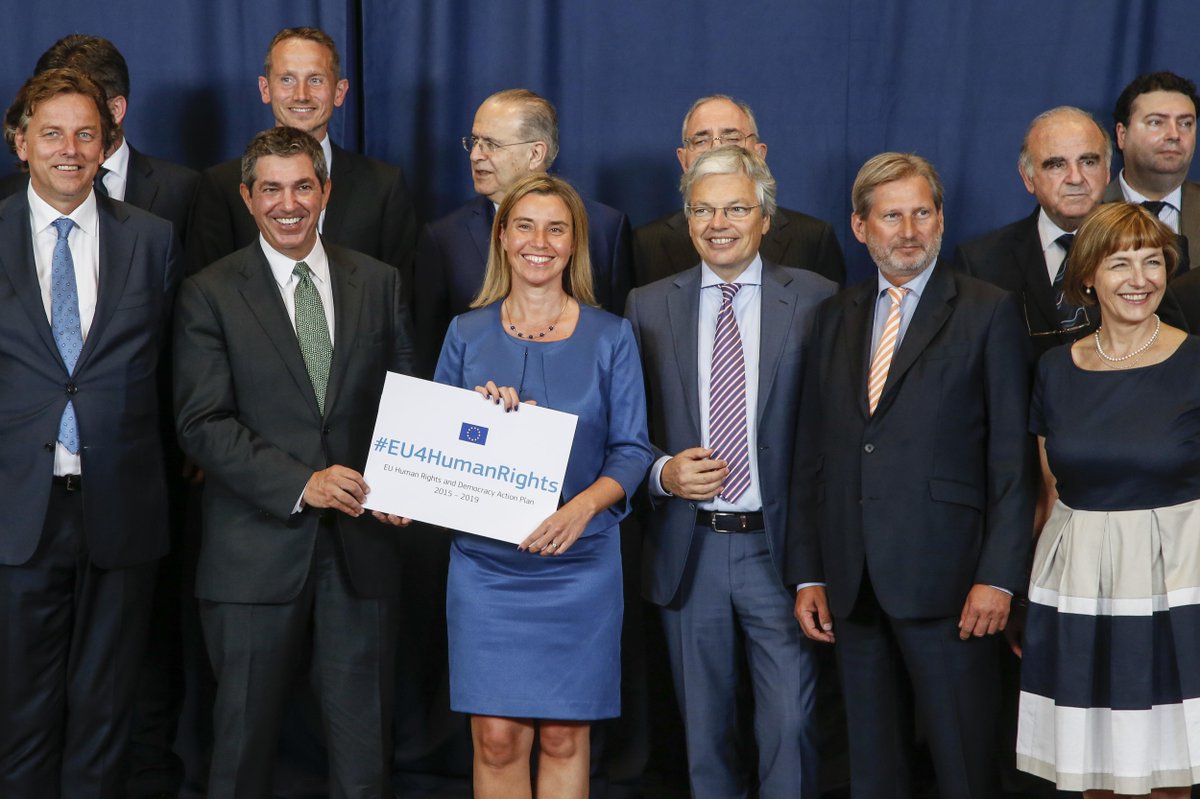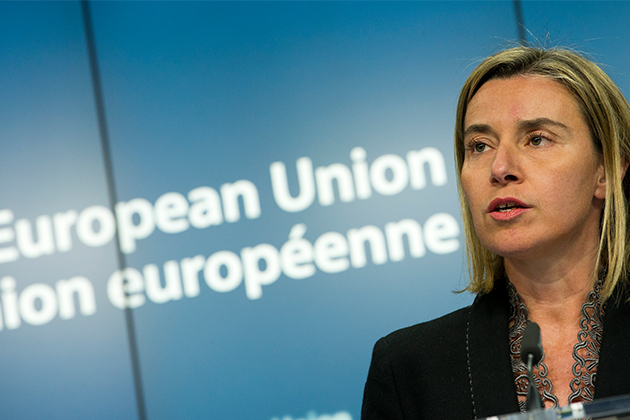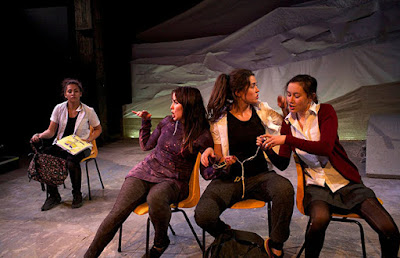05 August 2015
|
|
EU adopts human rights and democracy planFollowing the Foreign Ministers Council on July 20 the European Union adopted a new "Action Plan on Human Rights and Democracy" which aims to keep human rights at the heart of the EU's agenda. The new plan aims to reinforce the implementation of the EU's human rights policy with a special emphasis on strengthening ownership by local institutions, mechanisms and civil society actors. It also invigorates support for human rights defenders. During their meeting ministers discussed the Iran nuclear deal, Libya, Tunisia, the Middle East Peace Process, migration, climate diplomacy and energy diplomacy as well as Afghanistan, Pakistan, Mali, the Central African Republic and Burundi. For more see here.
|
|
|
Mogherini reaffirms support to Turkey and the Kurdish Peace ProcessThe High Representative for Foreign Affairs and Security Policy/Vice-President of the Commission, Federica Mogherini, held a phone call with the Foreign Minister of Turkey, Mevlüt Çavuşoğlu. The High Representative offered the EU's condolences to the Turkish government and the families of the victims in Suruç as well as those affected in other recent attacks against police and military officers. She reaffirmed the support for Turkey's efforts against ISIL and to the fight against any form of terrorism. At the same time, HR/VP Mogherini underlined the fundamental importance of keeping the settlement process with Kurdish people alive and on track. The High Representative said terrorist groups must not spoil the process and the ceasefire must be preserved. She said any action taken should avoid the risk of endangering the ceasefire and the Kurdish peace process that remains the best opportunity in a generation to solve a conflict that has claimed far too many lives.
|
|
|
EU Council moves forward on international protection of asylum seekersThe European Council has agreed on establishing a temporary and exceptional relocation mechanism from Italy and Greece to other Member States of persons in clear need of international protection. In line with existing rules, Italy and Greece guaranteed asylum seekers arriving on their territories were identified, registered and their fingerprints taken. The Member States, meeting within the council, agreed by consensus on the distribution of 32,256 persons needing to be relocated. Ministers committed to agree on the distribution of the remaining 7744 persons by the end of 2015. Luxembourg's Minister for Immigration and Asylum and President of the Council, Jean Asselborn, said following the meeting that the most important result was that "persons in need of international protection can be reallocated as from October this year. Our meeting has clearly shown that the European Union and its Member States are ready to overcome the challenge of the migratory pressure together," the President said. For more information about the meeting's outcomes see here.
|
|
|
A conversation between hemispheres: gender equality and realising the post-2015 development agendaThe chair of the United Nations Parliamentary Group and Federal Member for Murray, Sharman Stone, together with the Ambassador of the European Union to Australia and New Zealand, H.E. Sem Fabrizi and the United Nations Association of Australia, will hold a public forum on August 10 at Parliament House. The members of the United Nations are meeting in September in New York to finalise the Sustainable Development Goals (SDGs). This event will explore gender equality in the context of the new global post-2015 development agenda from the perspectives of the EU, Pakistan and Australia. The panel will be chaired by Dr. Sharman Stone MP who will be joined by Ambassador of the European Union, HE Sem Fabrizi; High Commissioner of Pakistan, HE Naela Chohan; and Deputy Secretary Ewen McDonald from the Department of Foreign Affairs and Trade. This is an open event hosted by the UN Parliamentary Group. In view of limited seating, please RSVP at Delegation-australia-rsvp@eeas.europa before 5 August. The event also marks the European Union's Year of Development. For media enquiries please contact nick.pedley@eeas.europa.eu.
|
|
|
Sharing the EU's hard-won knowledge on financial integrationThe EU has responded to the cross-border problems exposed by the global financial crisis with a vigorous attempt to increase financial integration, particularly in the banking sector. The EU has implemented a banking union which involves much closer harmonisation of national regulation. Australia and New Zealand are yet to reach a similar agreement for greater integration despite their systems being much closer in many respects. However the recent Financial System Inquiry in Australia has advocated immediate action on improving the framework for the resolution of banks. A workshop and discussion will take place in Melbourne on August 28 at the FINSIA boardroom in the Rialto Building to discuss the intricacies of Australian and New Zealand banking and the lessons which could be learned from the EU's banking union. This forms part of a research project run by Professor David Mayes at the University of Auckland, financed by the EU through the European centres network in New Zealand on the future of monetary and financial integration in Europe. The discussion is under Chatham House rules.
|
|
|
Connie Hedegaard to deliver this year's Schuman Lecture at ANUThe annual Schuman Lecture will be given in Canberra this year by the Former European Commissioner for Climate Action, Connie Hedegaard, at the ANU Centre for European Studies (ANUCES) on August 26. The Robert Schuman Lecture celebrates the remarkable achievements of European integration since its modest beginnings in the European Coal and Steel Community in 1951, announced in a declaration by French foreign minister Schuman. The Australian National University has recognised this achievement and foresight by coordinating the annual Schuman Lecture since 1996. UN negotiations are under way to develop a new international climate change agreement that will cover all countries. The new agreement will be adopted at the Paris climate conference in December 2015 and implemented from 2020. The European Commission has set out the EU's vision for a new agreement that will, through collective commitments based on scientific evidence, put the world on track to reduce global emissions by at least 60 per cent below 2010 levels by 2050. Therefore this year is focused on climate policy and Former Commissioner Hedegaard will be speaking on climate action towards results at the Paris COP21 talks. For more information see the Schuman Lecture reference site.
|
|
|
"Women in War" opera to open in MelbourneA global collaboration partly funded by the European Commission Culture Fund and the Department of Foreign Affairs and Trade has helped bring about a new opera production, "Women in War". The production features an international cast of Australian, Turkish and Greek artists in a contemporary Australian opera set during the Gallipoli campaign in 1915. It is a work that blends musical styles, rhythms and cultural nuances. It brings together three women protagonists - an Australian nurse who is keen to serve king and country, a Turkish mother in search of her wounded son serving in the Ottoman forces and a Greek war widow struggling to provide for her daughter on the Greek island of Lemnos, the ANZAC base. The modern day opera runs from July 30 to August 1 at the Arts Centre in Melbourne. The "Women in War" series also features a book and exhibition as well as an international conference held at the State Library of Victoria on July 31 where Dr Bruno Scholl, Chargé d'affaires of the European Union Delegation to Australia, will be speaking on the commemoration of World War I in Melbourne. The Lemnos Gallipoli project website has more details on all the events.
|
|
|
EU helps fund 'War Crimes' play in SydneyThe European Culture Funding Stream has played a major role in a new play, 'War Crimes', being performed in Sydney this month. The play is part of the "Documents of Poverty and Hope" project which was one of 12 successful applicants that received funding from the European Commission last year. "Documents of Poverty and Hope" brings together three theatres from Europe (Italy, Portugal and Great Britain), two from Canada and one from Australia to create new theatre pieces. The pieces are based on stories collected from young people about their migration experiences stemming from poverty and social isolation. The Australian Theatre for Young People has produced 'War Crimes' which is also web streamed live. War Crimes will run until August 1. More details on their website ATYP.
|
|
|
EuroScience week in AustraliaDuring the week July 13–17 2015, Australia's National Science and Technology Centre, Questacon, held its second EuroScience at Questacon with the Delegation of the European Union to Australia the major sponsor. EuroScience is a special programme showcasing the wonders of science through the eyes of Europe. The special event featured activities that highlight the work of European scientists past and present in a fun, family-friendly experience. The week involved 22 science shows and guest presentations including theatrical presentations on topics as diverse as European astronomy and dinosaurs as well as the story of Nikola Tesla and Marie Curie's notebooks. In addition there were Q Lab demonstrations drawing on key work from past European scientists. There was also a free professional development session for teachers where they received an insight into some of Europe’s most famous scientists with experiments from Newton, Pascal and Archimedes that can easily be replicated in any classroom. Questacon is also a member of the European Network of Science Centres and Museums (ECSITE).
|
|
|
Asia Pacific journalists called to apply for Lorenzo Natali Media PrizeThis year’s Lorenzo Natali Media Prize is launched under the motto 'Today's stories can change our tomorrow' and coincides with the 2015 European Year for Development. In December, the European Commission will once again award journalists for their outstanding reporting on development and poverty eradication. The competition is open to professional journalists working for all different media types. New to the 2015 competition, amateur journalists, including bloggers, can also apply for the prize. A grand jury will reward one professional and one amateur journalist from each of the following regions: Africa, the Arab world and the Middle East, Asia and the Pacific, Latin America and the Caribbean, and Europe. The selected winners will receive trophies and cash prizes of €5000. Furthermore, the winners are qualified to win additional €5000 grand prize during an award ceremony in December 2015. |
|
|
Europeans shift cinema from horizontal to vertical at MIFFAll 10 of the vertical films participating in the Vertical Cinema section of the Australian premiere at Melbourne International Film Festival (MIFF) are European productions. Vertical Cinema will be a special event within the MIFF programme and will take place on August 14 at the Deakin Edge Theatre. Vertical Cinema filmmaker Joost Rekveld will participate in a panel discussion titled Cinema, Reimagined. The panel will also include Vertical Cinema’s technical producer Erwin van ’t Hart, artist Sally Golding and University of Melbourne film and cinema studies lecturers Wendy Haslem and Scott McQuire. The discussion will be hosted by MIFF in collaboration with the University of Melbourne. The panel will talk about vertical screens, expanded cinema and the future of film. The vertical films are collaborations with directors from the Netherlands, Austria, Germany and Japan. For more information see the MIFF website. |













